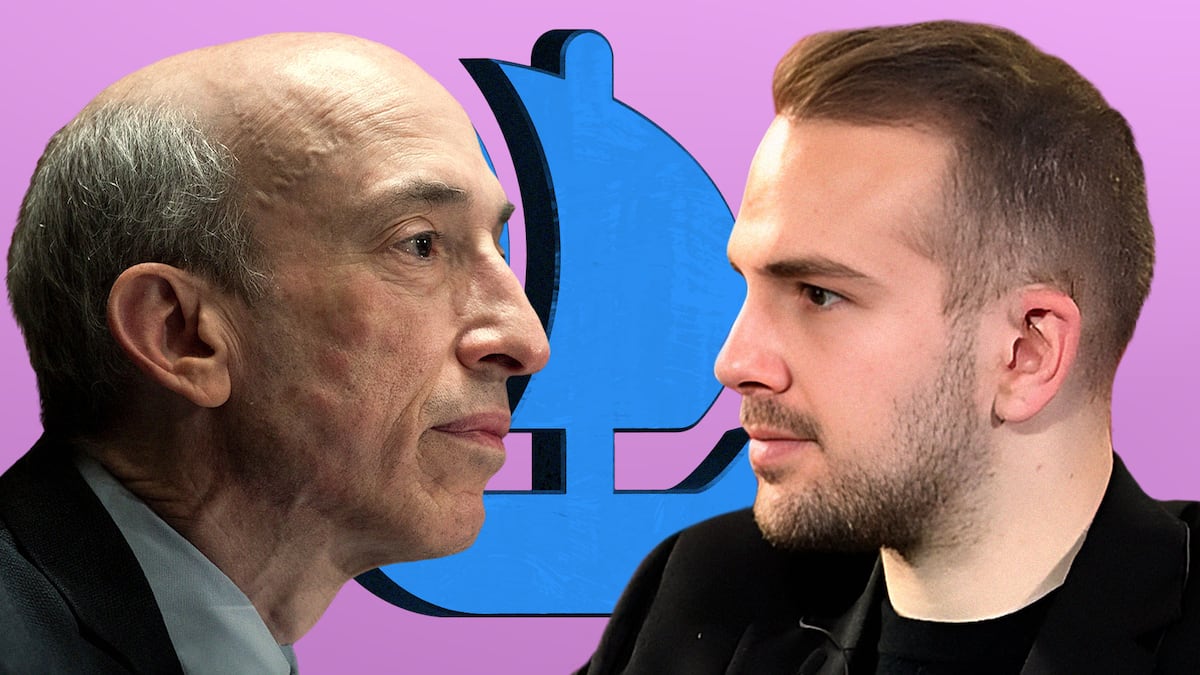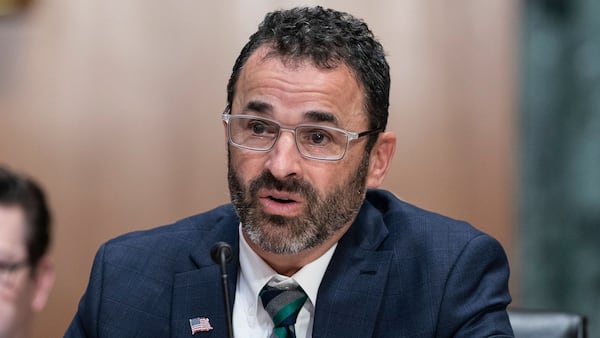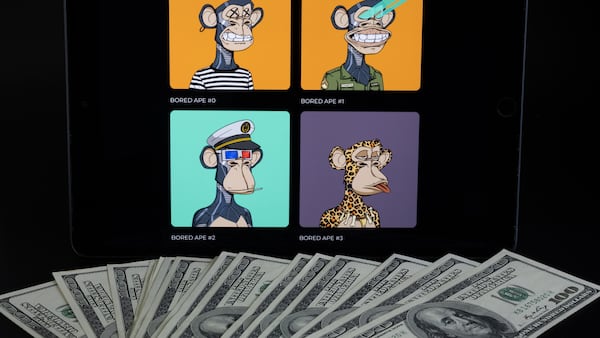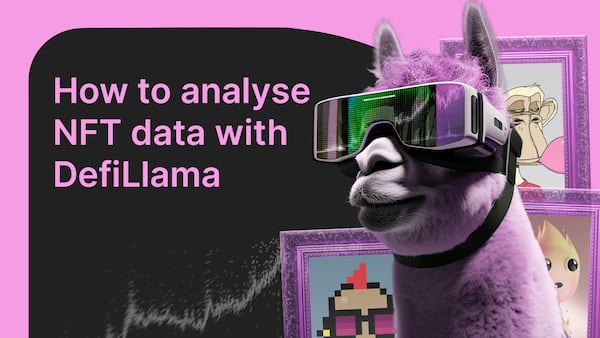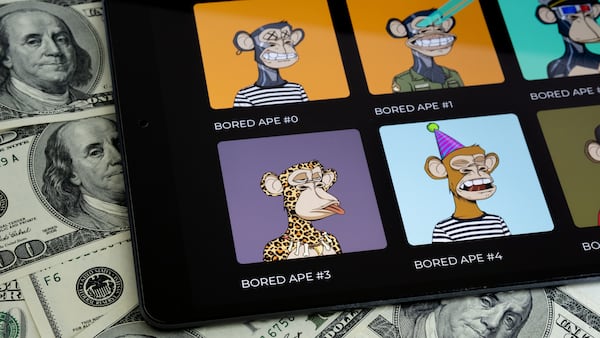- The marketplace has delisted and disabled NFTs deemed to behave like financial instruments.
- OpenSea directed employees to avoid using market terms such as ‘trading’ and ‘broker.’
- Earlier this year, the SEC notified OpenSea it was the target of an investigation.
OpenSea’s disclosure last month that it was being investigated by the US Securities and Exchange Commission sparked outrage in the crypto industry.
“Absurd,” said Kraken founder Jesse Powell.
“Unamerican,” tweeted Tyler Winklevoss, the CEO of Gemini.
Devin Finzer, the co-founder and CEO of OpenSea, also weighed in.
“We’re shocked the SEC would make such a sweeping move against creators and artists,” he wrote in response to an SEC letter warning of a potential enforcement action.
Jokes spread online depicting the Mona Lisa, Pokemon cards, and digital sports tickets as the SEC’s next potential targets. They mocked the idea that images and artwork could be construed as securities, and subject to federal laws.
But OpenSea, one of the largest global marketplaces for NFTs, has taken actions that suggest it has been aware for years that some NFT collections listed on its site are more than just art, according to three former employees of OpenSea, as well as company documents seen by DL News.
Delisted and disabled
OpenSea has regularly delisted or disabled non-fungible tokens, or NFTs, that may behave like financial instruments. It has targeted “anything which promised returns, had a token, or could be construed as a security in any way,” a person familiar with the practice told DL News.
The company issued a vocabulary guide directing employees to avoid using financial terms such as “broker,” “shares,” “trading” or “exchange,” in their communications, according to one company document.
While crypto leaders may scoff at the idea that NFTs are securities and ridicule Gensler and the SEC, OpenSea’s longstanding efforts to weed out problematic collections complicates the narrative. Aware of potential problems, the company acted.
A spokesperson for OpenSea declined to comment on questions sent by DL News for this article.
OpenSea’s tangle with the SEC comes as the venture struggles to recapture the mojo that drove the NFT space to such giddy heights in 2021. OpenSea’s revenue multiplied more than 18 times between the second and third quarter that year, to $167 million, according to an internal document.
Now, as the popularity of Bored Ape Yacht Club and other NFTs wane, OpenSea’s monthly volume has plunged about 55% in the last 12 months, to $36 million, according to Dune Analytics.
Through it all, OpenSea has laboured to screen the many NFT collections that have been listed on its platform.
Disabled turtles
In October 2021, OpenSea disabled trading of a collection called DAO Turtles after finding the pixelated images of the shelled amphibians violated its terms of service, according to social media posts by DAO Turtles.
That meant visitors to OpenSea could still see the NFTs, but they couldn’t buy or sell them.
OpenSea told DAO Turtles’ team that NFT collections could not use the platform to carry out financial services such as ”listing, or buying securities” and similar instruments, or fundraising, according to a screenshot of an email.
While OpenSea did not provide any details on precisely why DAO Turtles raised a red flag, the NFTs were more than images on a blockchain.
Owners could collect royalties from future releases, and receive an associated cryptocurrency called Turtleshells, according to an archived version of the project’s website.
Not just art
Other collections OpenSea delisted or disabled on its site for violating the prohibition on financial assets include Steady Stack, and Yaypegs, said a former employee.
The teams behind DAO Turtles and Yaypegs did not respond to requests for comment. A representative for Steady Stack could not confirm why the collection was delisted.
Non-fungible tokens don’t just represent art. Many stand in for physical objects, virtual real estate, and more.
Regulators have been building cases that NFTs can be securities or regulated financial instruments. In May 2023, former OpenSea employee Nate Chastain was convicted in the first-ever NFT insider trading case.
“We have a strong responsibility to our community, and we take any breach of trust incredibly seriously,” wrote Finzer after Chastain resigned.
And archived versions of OpenSea’s website show that it hosted three collections that the SEC later slapped with securities-related charges.
The collections — Impact Theory, Stoner Cats, and Flyfish Club — settled with the SEC without admitting or denying allegations.
Terms of service
From the get-go, OpenSea addressed the financial capabilities of NFTs in its terms of service.
“WE ARE NOT A BROKER, FINANCIAL INSTITUTION, OR CREDITOR,” reads the earliest archived copy of its terms of service from August 2018, which was printed in all caps to hammer the point home.
Two years later, in October 2020, OpenSea added clauses that prohibited users from “any financial activities subject to registration or licensing, including but not limited to creating, listing, or buying securities, commodities, options, real estate, or debt instruments.”
‘Can you use an NFT to make a securities offering? Absolutely.’
— Philip Moustakis, securities lawyer
The marketplace also barred any assets “that are redeemable for financial instruments or that give owners rights to participate in an ICO or any securities offering.”
ICO is an acronym for an initial coin offering, a token distribution practice the SEC targeted around 2018.
In 2022, the SEC began to send OpenSea information requests, The Verge reported in August. As part of that process, the company received a Wells notice, which is a notification the agency sends to the target of a potential enforcement action. Finzer said in August that OpenSea received the notice “recently.”
Securities offering
If the SEC sues OpenSea, it would have to show that certain NFT collections the company listed are unregistered securities, said Philip Moustakis, a New York-based securities lawyer at Seward & Kissel.
“Can you use an NFT to make a securities offering? Absolutely,” he told DL News.
Moustakis added that it’s not about the technology, but rather the offering, or the initial sale of objects, which can be pieces of paper, computer code, or even citrus groves.
Generally, the SEC follows legal guidance that an asset is a security if purchasers have a “reasonable expectation of profit from others.”
On September 19, users sued OpenSea for allegedly offering NFTs that behaved like financial instruments.
“NFTs are treated like securities by OpenSea despite being unregistered with the SEC,” said the complaint, which is being managed by Adam Moskowitz, a lawyer behind some of the largest class-action lawsuits in crypto.
OpenSea rejected the claim.
“Conjuring from thin air a purported class action lawsuit based on our disclosure of an SEC Wells notice won’t make the allegations in the complaint true,” said an OpenSea spokesperson. “We refute these allegations and look forward to defending against this baseless lawsuit.”
‘Whack-a-mole’
It fell to OpenSea’s Trust and Safety compliance team to police the huge volume of content hitting the site day in and day out. The NFT marketplace’s legal and moderation teams were “dedicated beyond belief” and used computer programmes to sift through the flood of content hitting the site, said one former staffer.
“But if you’re ingesting every NFT on many blockchains, it’s just whack-a-mole,” they said.
In the third quarter of 2023, OpenSea delisted more than 20,000 collections that directed users to websites that were likely steal users’ crypto, according to an internal document.
‘If you’re ingesting every NFT on many blockchains, it’s just whack-a-mole.’
— Former OpenSea employee
The platform also dealt with users attempting to list collections that purported to give purchasers membership to “an exclusive wealth club,” one person said.
And it wasn’t always easy to parse whether a user was buying an NFT for the art or for its promised rewards, said another ex-staffer.
(The three former employees asked not to be named because they were not authorised to speak publicly about OpenSea’s internal policies.)
NFT issuers were not happy when they got flagged.
“We engaged constantly with people who were mad about their collections not being able to trade because we’d delisted them for potential financial elements,” another former employee said.
Employees in an all-hands meeting were instructed to watch what words they use when talking to each other or the public about NFTs, according to an internal document.
Instead of “profit,” employees were instructed to say “appreciation” or “value change.”
‘Fun ride’
DAO Turtles did promise to “bring value” to its holders, according to its site, and OpenSea took action.
When users could no longer buy or sell DAO Turtles NFTs on the platform, the collection cratered.
“Our project has been frozen on OpenSea quite early on, which killed our momentum completely,” wrote the DAO Turtles team in a May 2022 message on Discord.
Almost one year later, DAO Turtles released a video game based on its moribund NFT collection.
“This brings our story to an end,” wrote the team at the time. “It was a fun ride.”
Ben Weiss is a Dubai Correspondent at DL News. Got a tip? Email him at bweiss@dlnews.com.


